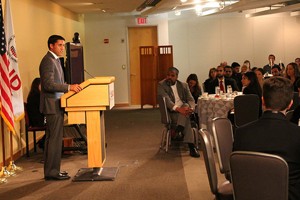
[As prepared for delivery]
Ramadan Kareem. Thank you for joining us.
This is our 12th annual Iftar dinner at USAID—and an especially meaningful time for the Agency, as we pause from our busy lives and hectic jobs to share a meal together as the sun sets.
As President Obama said on Monday at the White House Iftar dinner, Ramadan is a time for reflection and devotion—a chance to honor a faith known for its diversity and commitment to the dignity of all human beings.
Some of you are our closest partners and know us well, and some of you here are just getting to know us—so let me start by telling you a bit about us as an Agency.
We’re the United States government’s humanitarian leader—responding alongside many of you when the earthquake shattered Haiti or the typhoon swept over the Philippines.
We’re the government’s global health leader—working with you to ensure every child survives and thrives.
We’re the government’s global education leader—working with you in rural villages of Afghanistan and refugee camps on the Syrian border to get girls in school.
Regardless of where we work, we are driven by one core mission: to end extreme poverty and advance the dignity of every human being.
Yet, we come together tonight at a time when this mission—and our values—are being tested.
Across the globe, millions of children—especially girls—are facing daunting threats.
Syria’s children continue to endure relentless dangers, from barrel bombs to extremist militias.
India’s girls risk their lives every time they fetch water or visit latrines.
And Nigeria’s children are finding school a target for terrorists rather than a sanctuary for learning.
All it takes it one look around the world to see that our joint efforts and advocacy are more critical than ever.
You represent organizations that stand up for this moral mission in diverse and important ways...
…from Vital Voices, which empowers women to attain an education, start businesses, and lead their communities…
… to Developments in Literacy, Fiza Shah’s organization, that focuses on improving the quality of math and reading through mobile learning.
You know, better than most, that if we want to truly achieve our goal of ending extreme poverty in our lifetimes…
…we cannot leave behind half of the population.
That’s why, last month, many of you came together to help launch Let Girls Learn, a powerful movement to call attention to the importance of investing in girls—in their education, in their health, in their potential.
In fact, more than 150,000 people have already joined you in watching the video we played just a few moments ago.
And it’s why our Agency took a close look at our own efforts and launched a new policy to put innovation and partnerships at the center of our work with women and girls.
These aren’t just fancy principles. They’re delivering results for the world’s most vulnerable children.
Today, in Nigeria, we’re helping get half-a-million children, including 250,000 girls, get into school and actually learn.
In Jordan, we’re providing emergency education to 150,000 child refugees—including 60,000 girls—who have been forced to flee violence in Syria.
And in Afghanistan, three million girls and five million boys are enrolled in school—compared to just 900,000 when the Taliban ruled by terror.
Today, we’re proud to build on that legacy of action, by announcing the launch of the American Scholarship Program for Afghan Women.
The scholarship will empower nearly 1,000 Afghan women with professional training for in-demand careers, like technology, healthcare, and engineering.
At a moment when the world is wondering about the future of Afghanistan in the face of real political challenges, these women represent a new generation of modern leaders and the forward defense of our nation.
You know, just this past Monday, we celebrated Malala Day—in honor of the young activist who reminded the world that courage can overcome our greatest challenges.
It made me think of my daughter, Amna, who is five years old.
She looks up to Malala just as much as I do.
I’ve seen my daughter’s smile, curiosity, and energy in the faces of girls I’ve met around the world—girls who have power to replace a legacy of lost potential with one of vibrant growth.
As we break bread together tonight, I’m reminded of the boundless potential of girls just like my daughter—and just like Malala…
…and of the importance of the values we’re upholding around the world.
Thank you.







Comment
Make a general inquiry or suggest an improvement.